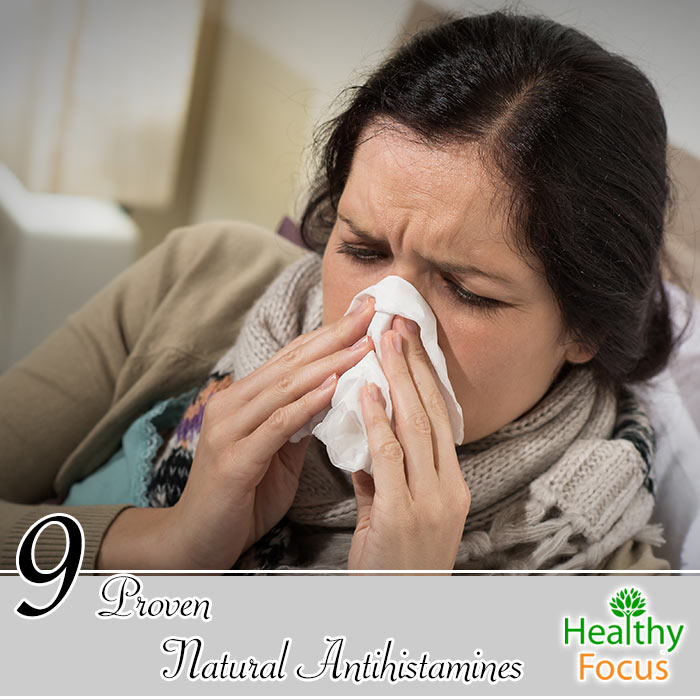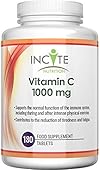9 Proven Natural Antihistamines

I am very familiar with seasonal and plenty of other types of allergy. As a child, I suffered very badly from springtime onwards with all the usual symptoms including rough, itchy or watering eyes, constant bouts of sneezing and congestion.https://e6cc634481617121802c1ec21da26c1f.safeframe.googlesyndication.com/safeframe/1-0-37/html/container.html

Spot testing found that I was extremely allergic to everything from house dust to rabbits to human hair of all things. Funny enough, I was allergic to cats but not to dogs so we had to say farewell to Lucy the cat while the dogs remained as part of the family.
Back in those days, there was little awareness of natural treatments for allergies and I was largely treated with antihistamine medications before finally being cured with a series of injections known as allergen immunotherapy over the course of a year or so.
Pharmaceutical antihistamines are well-known to have an extensive list of undesirable side effects. They make you very tired and as a child they had a detrimental effect on my ability to focus at school and to my work at night.

Organic Spirulina Powder by Nukraft: (Available in 250g, 500g, 1kg and 25kg)£7.45

Vitamin C 1000mg | 180 Premium Tablets (6 Month’s Supply) | High Dose Quality…£9.99Ads by Amazonhttps://e6cc634481617121802c1ec21da26c1f.safeframe.googlesyndication.com/safeframe/1-0-37/html/container.html

People taking antihistamine medication are advised not to drive not operate machinery which can affect their day to day lives and also their ability to work effectively and safely.
Fortunately, there is growing evidence that you can keep your allergic reactions in check naturally and with far fewer of the after effects so familiar to those who rely on over the counter medications.
HOW ANTIHISTAMINES WORK
Allergic reactions are effectively your body’s immune response to a substance which is otherwise harmless. When a substance like pollen, pet dander or dust makes contact with your mucus membranes whether in the nose, throat, mouth or lungs an immune response occurs which causes histamine to be released.
Histamine is actually a protein and its release into your system is responsible for the many familiar allergic symptoms that you are so desperate to be free of.
Antihistamines, as the name implies, inhibit the production of histamines and prevent allergic reaction from happening.
If you suffer from allergies, then no doubt you have tried various antihistamine medications and you may well have also suffered from their side effects.
Fortunately there are alternatives to be found in nature and various foods and herbs may be an effective and much safer option. Let’s take a look at some of the best-known natural antihistamines.READ Benefits of Sulfur
NATURAL ANTIHISTAMINES
1. QUERCETIN
Quercetin is a plant flavonoid and natural antioxidant found in a number of foods including apples, onions, citrus fruit, red wine and berries. Several animal studies have showed that quercetin was an effective treatment for allergies because of its ability to reduce the respiratory effects of histamine.https://e6cc634481617121802c1ec21da26c1f.safeframe.googlesyndication.com/safeframe/1-0-37/html/container.html

A study published in 2007 demonstrated that quercetin reduced inflammation in the airways of rats with researchers concluding that it was a potential natural treatment for allergies. (1)
Quercetin is widely available in supplementary form but you could also try adding foods rich in quercetin to your daily diet. The recommended dose of quercetin for allergic rhinitis is between 250 mg and 600 mg three times each day before meals and may be more effective when taking bromelain at the same time.
2. STINGING NETTLE
Stinging nettle is a commonly used herb which is often drunk in the form of a soothing, healthy tea. Studies have revealed that it may actually be an effective treatment against allergies.
One commonly cited study with 60 participants found that 58% of those who were treated with stinging nettles at a dose of 300 mg a day experienced a significant reduction in their allergic symptoms with 48% rating it effective when compared to their prescription medications. (2)
3. VITAMIN C
Studies have found that Vitamin C can exert a variety of inhibitory effects on histamine. It seems to block the secretion of histamines by the body’s white blood cells and also to improve its detoxification. One study that treated participants with a vitamin C nasal spray 3 times a day found that 74% experienced an improvement in allergic symptoms including congestion and edema.
Vitamin C is a great option to deal with your allergies because it is non-toxic and free of any unwanted side effects. Of course, you can get increase the amount of dietary vitamin C in your diet but supplements are also freely available. Studies suggest taking at least 2 grams each day for allergic rhinitis.

